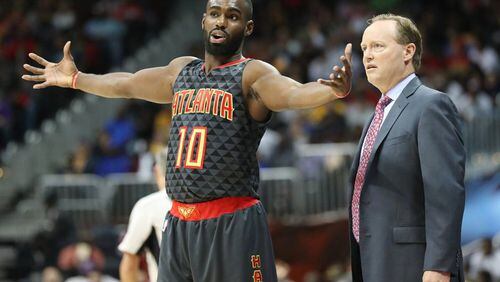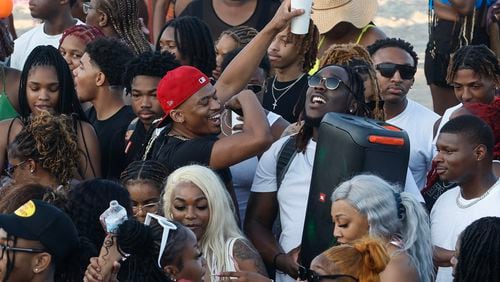The Atlanta Hawks extended a qualifying offer to Tim Hardaway Jr. This is a procedural move that will enable them to match any offer he might accept from another team and thereby retain him. (They did this with Jeff Teague, you'll recall. As we can never forget, they did it with Jon Koncak.) Question is, should they match/keep Hardaway?
Most of this, I submit, rides on the answer to another question: How badly do they want to land in the 2018 lottery? Were I the Hawks, my answer would be, "Desperately." They haven't revealed theirs, though a revelation will be forthcoming in the next 10 days. I cannot imagine them paying max money to re-up the 32-year-old Paul Millsap, but they might. As for Hardaway ...
He turned into a useful player last season. That's not quite the same as being a consistently good player. Kent Bazemore is a useful player whom the Hawks paid dearly to re-sign last summer, and I'm reasonably certain new management would dump that contract in a millisecond. My argument against Hardaway is the same as mine was against Bazemore: He's just a guy. Every NBA team, even the lousy ones, has similar guys.
I say this having witnessed firsthand Hardaway turning, albeit briefly, into Kobe Bryant. His fourth quarter in Houston three nights before the Super Bowl was astonishing. I'd never seen anything like it from any Hawk, and I caught the Hall of Famer Dominique Wilkins at the peak of his powers. The Rockets, who would finish with the NBA's third-best record, couldn't guard Hardaway. James Harden and Mike D'Antoni (newly minted coach of the year, FYI) kept casting the look toward one another that Butch gave to Sundance: Who IS this guy?
By season's end, Hardaway became a starter. Come the playoffs, he became a non-factor. He made 32.9 percent of his shots and 26.2 percent of his 3-pointers in six games against Washington. That's a small sample size, but it shows what can happen when a team game-plans for an opponent. On a Thursday night in February, the Rockets weren't game-planning for the Hawks' subs.
We saw in the brief postseason the flip side of pairing Hardaway with Dennis Schroder as the starting backcourt: Both are swinging gates on defense. Steals aren't a full measure of defensive prowess, but Hardaway had three in the series. He also had seven assists against 10 turnovers. If he's not scoring -- he averaged 12.8 points against the Wizards on 13.7 shots -- he's not an asset.
If the Hawks could persuade Hardaway to take a reasonable salary on a short-term basis, that'd be one thing. With restricted free agents, you're forced to accept/decline a contract that another team has negotiated. When Teague signed his offer sheet with Milwaukee in 2013, it was for $32 million over four years. That wasn't unreasonable, which is why Danny Ferry chose to match. Ferry would have preferred it be to for one fewer season, but that's the way of offer sheets.
If we know anything about Travis Schlenk, it's that he said he wants no oppressive contracts on his ledger. (Then again, he just up and traded for Miles Plumlee , scheduled to make $37.5 million over the next three seasons.) With Dwight Howard gone and Millsap surely going, the Hawks aren't apt to be in playoff contention next season. If you're not in playoff contention, do you need Hardaway at any price?
Which brings us to the truly fascinating part of a fascinating issue: Can the new general manager/head of basketball operations say to Mike Budenholzer, recently the head of basketball operations and still the coach, "Hey, Bud. We're tanking"?
It was Budenholzer who made the in-draft move in 2015 to trade for Hardaway, who was considered a Knicks draft whiff, but who torched the 60-win Hawks for 23 points on the penultimate night of the regular season. It was Budenholzer who stuck with Hardaway even as he was shipped to the D-league early the next season. This coach turned a project into a useful player and eventually a starter. If Hardaway departs, here's your Hawks for 2017-18: Schroder, Bazemore, Taurean Prince, DeAndre Bembry, Mike Dunleavy and some rookies. (Oh, and Miles Plumlee.)
Meaning: Hello, lottery. And maybe: Goodbye, Bud.
I'm sure the new GM wants to rebuild. (If he doesn't, he shouldn't have been hired.) I'm sure he values Budenholzer as a coach, but we just saw the biggest acquisition of Budenholzer's managerial tenure shipped to Charlotte for spare parts. Millsap is another test case, but I'm guessing even a coach who's trying to win games can grasp that spending $205 million on a 32-year-old who isn't LeBron would be the height of folly. (Then again, it's believed the schism with the defrocked Wes Wilcox arose over Wilcox's desire to trade Millsap last winter.)
The new GM has been handed a roster with a few useful pieces and no great answers. He also inherited a strong-willed coach who was, not so long ago, making the decisions that now fall to Schlenk . Being a coach, Budenholzer wants good players. But good players come at a cost, and I'm not sure the Hawks need to be spending. For the 15th time: They really do need to get into the lottery. Which means they don't need to be matching an offer for a guy who's just a guy.
About the Author







